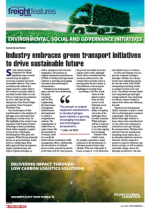South African logistics companies are taking significant steps towards transforming the logistics sector into a greener and more sustainable industry. This comes as industry has realised the urgent need for a major shift in the country's economy, which is currently heavily reliant on coal, if it is to reach net-zero emissions by 2050, said Liesl de Wet, chairperson of the Road Freight Association Green Transport Work i ng Group. One crucial aspect of this transformation is the adoption of hydrogen as an alternative fuel. Speaking at a recent event, De Wet highlighted the country's vast experience with Fischer-Tropsch technology at Sasol, positioning South Africa uniquely to explore various forms of hydrogen, including green, blue, grey, and turquoise. While Europe primarily focuses on green hydrogen, South Africa is considering a three-pillar approach that encompasses supply, manufacturing, and import of green hydrogen, as well as equipment and consumer integration. The pressure on original equipment manufacturers (OEMs) to develop hydrogen-based solutions is growing, encouraging innovation and technological advancements.“Infrastructure development plays a pivotal role in facilitating this green transition,” said De Wet, emphasising the importance of integrated infrastructure and equipment to achieve a comprehensive solution. The centralisation of traffic f lows on major routes, like the autobahn in Germany, could be a model for South Africa's coordinated traffic management efforts. Additionally, the introduction of overhead electric trucks, powered by electric power lines used for tram systems, has proved successful in certain regions of the world. Although South Africa currently lacks the necessary infrastructure, the concept shows promise and is a starting point for the country to find solutions to the transport challenges it currently faces.According to De Wet, South Africa is well-placed to learn from the first movers in the hydrogen sector and has the ability to leapfrog over some of the challenges faced by other countries. While hydrogen still has a long way to go, investment is not only ongoing but increasing.Daimler’s new GenH2 truck, for example, represents a major milestone in the development of hydrogen-powered heavy-duty vehicles. With two 40kg tanks, it boasts a range of 1 000 kilometres and refuels in just 10 minutes.De Wet said Daimler was not the only company looking at hydrogen vehicles, but concept trucks were undergoing testing all over the world, with OEMs anticipating launching models to market between 2025 and 2030. The debate between liquid and compressed gas hydrogen storage methods was continuing as industry experts worked to ensure both safety and efficiency, she said.“Research and development (R&D) continues to play a crucial role in advancing green transport technologies. The focus has shifted from light vehicles to heavy-duty trucks manufactured on-site, with costs estimated at around four euros per litre/kg for transportation. Platinum fuel cells have become mainstream, benefiting South Africa due to its abundant platinum resources. However, further research is needed to improve efficiency and battery storage, as well as explore renewable energy sources for hydrogen production,” she said

